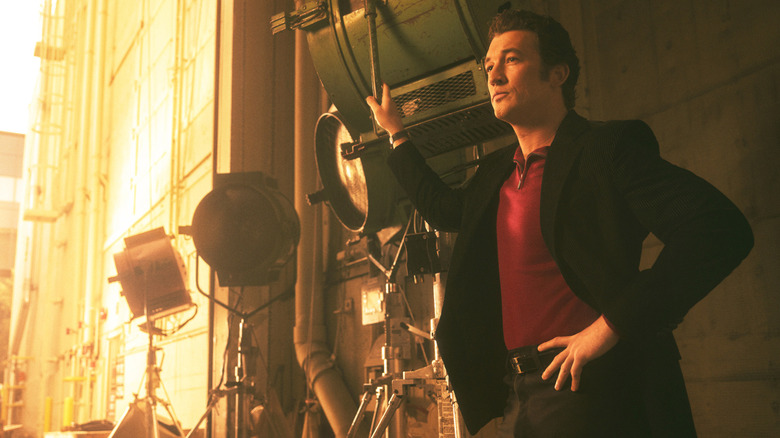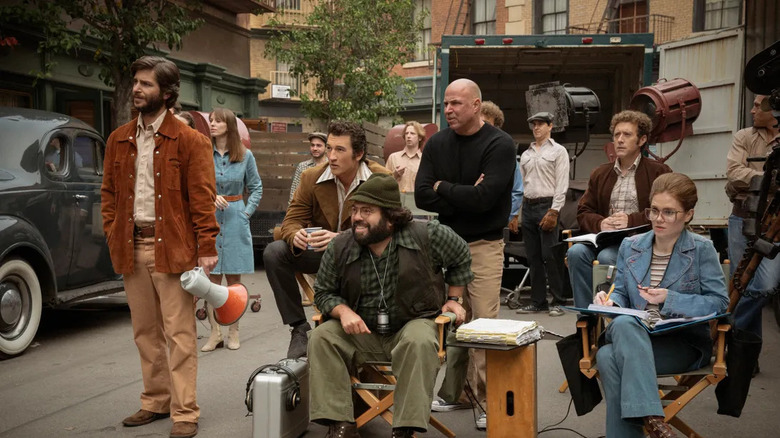
Just as some meetings should be emails, some TV shows should be movies. Never has this felt truer, in enormously extended fashion, than in the Paramount+ limited series "The Offer." In short, "The Offer" is the unnecessary answer to the question, "How did they ever make a movie out of Mario Puzo's wildly popular novel about the Corleone family of criminals?" But "The Offer" is not intended to be experienced "in short." Lasting ten hourlong episodes, "The Offer" goes into uselessly exhaustive detail about the making of "The Godfather," stranding its cast in a story that has absolutely no suspense or dramatic interest largely because ... well, we all know how the story ends, broadly speaking.
The opening credits to each episode of "The Offer" (I've seen all ten installments) make clear that this show's roots are very specific. Francis Ford Coppola's 1972 film has inspired countless think pieces, essays, and books over the decades, of course. However, "The Offer" is, and here I quote directly from the opening credits, "based on Albert S. Ruddy's experience making 'The Godfather.'" Ruddy is the lead of "The Offer," played by Miles Teller as a smooth operator who begins as a computer programmer with dreams of working in Hollywood. Those dreams are realized within the first episode, as he's soon successfully pitching the '60s sitcom "Hogan's Heroes" and becoming a part of the industry limelight. (Though the show plays fast and loose with reality, Ruddy really did co-create the WWII sitcom.) Soon, Ruddy is all but sneaking his way onto the Paramount Pictures lot to convince studio head Robert Evans (Matthew Goode) to take on bigger projects, such as, say, the hotly contested and controversial adaptation of a novel called "The Godfather."
It is worth emphasizing the obvious: "The Godfather" is one of the greatest films of all time. And it tracks that the making of one of the greatest films of all time might well be a story worth telling. But a ten-episode limited series is a patience-tester, almost from the word go. Put it this way: if you watched the entire "Godfather" trilogy, you would a) have watched one of the great movie trilogies ever, and b) watched something shorter than the combined runtime of the ten episodes of "The Offer." Though only a couple of episodes clock in over 60 minutes, none of them merit such length or such a snail-like pace of explaining how the original film — and just the original, mind you — came together.
A Case Of Glorified Cosplay

Now, if the worst thing about "The Offer" was its aforementioned inability to play fair with time and cultural references, that would be an obstacle worth waving away. (To wit: at one point in a scene taking place in 1970, Robert Evans makes a reference to Peter Falk's iconic role as the rumpled Lt. Columbo ... a role that, as of 1970, Falk had played just once in a 1968 pilot episode. It's hard to imagine that single episode being popular enough two years later for anyone to make a "one more thing" reference. I digress.) The problem is that because "The Godfather" is one of the greatest films of all time, its power and influence have expanded so much that the details of its making are neither terribly top-secret nor that entertaining to learn about in the year 2022.
"The Offer," in its frustrating and poorly illuminated creative path, is often reminiscent of the 2013 hagiography "Saving Mr. Banks," in which the Walt Disney Company made a movie about one of its most famous movies, "Mary Poppins." "Saving Mr. Banks" treated the legitimate criticisms of author P.L. Travers as something to shrug off in favor of movie magic. In that film, when Travers decries the possibility of a "Mary Poppins" adaptation having a) music, b) animation, and c) Dick Van Dyke, it's easy to laugh off because ... well, we know the 1964 classic has all three of those elements. But it also makes for a dramatically inert story, because all of Travers' complaints come to nothing, and the film many people rightfully adore is ... the film many people rightfully adore.
The same is true over a much longer period of time for "The Offer." When we see Robert Evans angrily shout that the young actor Al Pacino will never play Michael Corleone, it's played somewhat for suspense — what will make Evans change his mind? But the issue is representative in that question. Basically, every person who watches this show knows that Evans will have to change his mind, because — spoiler alert — Al Pacino played Michael Corleone.
All this said, "The Offer" makes clear what kind of show it is in literally its first minute: in New York's Little Italy, we see two men from one of the city's crime families walking through a thoroughfare into a building, one chiding the other to "leave the cannoli" from an outdoor bakery. (Yes. Really.) From this point forward, "The Offer" feels like nothing more than glorified cosplay. The ensemble cast looks right enough, from Teller and Goode to Burn Gorman as Gulf and Western executive Charles Bluhdorn and Dan Fogler as cinematic genius Francis Ford Coppola. Some of them are delivering good performances, too, but so often, they are hampered by the fact that every attempt to wring tension or pathos out of the story is pointless: we all know that "The Godfather" gets made, and becomes as big a hit everyone thinks it will be, if not a bigger hit.
A Show That Can't Live Up To Its Ensemble

The best performance of all belongs not to Teller — who's fine as a low-key hustler trying to keep his head about him — but to Matthew Goode. It helps, of course, that Robert Evans was a larger-than-life figure, as much of a star within the industry as the actors and directors with whom he worked at Paramount. But Goode dives into the part of Evans, with his distinctive twang, style of speaking, and glasses, like it's a ten-course meal. Evans' arc is as much about his attempts to reign supreme in Hollywood as in failing to handle his marriage to A-Lister Ali MacGraw, but Goode is strong throughout. Running closely behind him are Gorman and Juno Temple, the latter playing Ruddy's tenacious secretary who's got more ideas up her sleeve than the average assistant. (Fans of her work on "Ted Lasso" will identify her character Bettye McCartt as a spiritual sibling to Keeley, simply in terms of her ebullient nature and quirky charisma.)
Perhaps the performances being almost uniformly solid is what makes "The Offer" so frustrating. There's no better way to describe how unnecessary this limited series is as a ten-episode story than in the one key aspect of the show yet mentioned, that of the Mob itself. The Mob is largely represented by real-life figure Joe Colombo (Giovanni Ribisi), who spearheaded the Italian-American Civil Rights League in response to the widespread popularity of Puzo's novel and the prospect of a stereotypical film adaptation. But co-writer and creator Michael Tolkin struggles with balancing the making of a film so beloved that it re-established the concept of the Mafia to audiences worldwide, about as much as Ribisi struggles with making Colombo a fearsome figure, not a lazily hypocritical one. (Just one note: considering how fierce Colombo is in the first couple of episodes about never allowing a "Godfather" adaptation, it's remarkable how quickly the show's version of the criminal folds as long as the word "Mafia" isn't mentioned in the script.)
The weight and power of Mob movies is such that every time "The Offer" tries to make its own version of a Greek tragedy out of the Colombo Family, it serves as a reminder of those better films. It's not just that "The Godfather" itself hovers over this subplot; when Joe, at one point, dryly says "It is what it is," it's difficult to not think of Martin Scorsese's last film, the brilliant "The Irishman," and another real-life Mob enforcer saying that same dismissive line. When characters enter the Copacabana, it's hard not to think of "GoodFellas." And so on.
Among the many films that hover over the existence of "The Offer," there's one more to call out: the scathing and savage Hollywood satire from 1992, "The Player," from director Robert Altman. That film had a shrewd eye on how the industry was becoming so comfortable just revising and remixing older stories to newer, less discerning audiences. It was a sly take on the industry with a darkly comic bent. And it, like "The Offer," was written by Michael Tolkin. But "The Offer" feels like the kind of joke premise that would've made it into "The Player" as a gag in the extended long-take opening shot. A joke tagline in that film read "Movies ... now more than ever!" "The Offer" tries its best with a cast collectively elevating itself above the material, but it cannot get out of the shadow of so many classics while embodying the soullessness of that tagline. It's that "Saving Mr. Banks"' problem, writ large. Comparatively, "Saving Mr. Banks" is a better project than "The Offer," if only because the former had the good sense to be a two-hour movie, not a ten-hour limited series.
/Film Rating: 3.5 out of 10
"The Offer" Premieres on Paramount+ on April 28, 2022.
Read this next: The 14 Greatest Biopics Of The 21st Century
The post The Offer Review: A Limited Series That Should've Been A Movie appeared first on /Film.
0 Commentaires